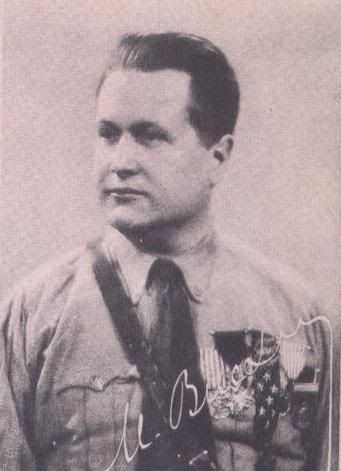Marcel Bucard
From Kaiserreich

|
Marcel Bucard (born on December, 7 1895 in Saint-Clair-sur-Epte, France) is a French Syndicalist politician and military officer. Leader of the Sorelian wing of Communal politics along with Georges Valois, distinguished during the French Civil War, he is chairman of the Versailles labour council since 1924.
Biography
Son of a butcher, Bucard attended Notre-Dame de Grand-Champs secondary school in Versailles, before entering minor seminary: he was about to be ordained a priest when the Weltkrieg broke out. Voluntarily enlisted, he was quickly distinguished by his courage: corporal by 1914, he was lieutenant colonel when the war ended in 1919 for the French army. Wounded three times, he received the prestigious Légion d'Honneur, Médaille Militaire and Croix de Guerre, and was mentioned ten times. Deeply traumatized by the war, and most particulary by the loss of many of his friends, such as the priest Léandre Marcq. Although he was deeply exhausted, the defeat of his country made him a rabid opponent to the government, and he mutineed and joined the Revolutionnaries with his whole regiment during the November 1919 General Strike. Immediately appointed colonel, he was among the main commanders during the decisive Battle of Vichy. When the war was over, Bucard had been made General and Deputy to the Delegate to Defensive Affairs.
In the local elections that followed the 1923 purges, Bucard, a renowned war veteran, was easily elected chairman of Versailles labour council in 1924, as the official candidate. However, an early tentative to be elected Delegate to Defence Affairs or Commander of Communal Ground Forces ended with his total defeat, Emile Pouget being too defiant towards a former to-be priest who had sided with the Syndicalists by pure bitterness. Even if his following candidacies also ended by a defeat, Bucard was now developing an increasing anger towards the Comité de Salut Public. He thus joined Georges Valois' Cercles Georges Sorel: Valois, a former monarchist, had managed to create a patchwork of nationalism, vengefulness and revolutionnary politics that seduced Bucard.
Bucard was determinant in giving the Sorelians a recognized position in the Commune politics, thanks to his status of war veteran, but also of his slow transformation of the movement into a paramilitary and well-organized form, borrowing elements from national-populist groupuscules throughout the world. About to break with Valois about the Jewish Question (Bucard considering Jews as "agents of the German imperialist supremacy" in quite criticized speechs), Bucard decided to remain in the movement in order to keep political importance: his imitation of National-Populism was harshly criticized, along with his propensity with personnality cult, eventually declaring himself "Chef" (Chief). Unsuccessful candidate to the 1931 election for Chairman of the CSP, he is still considered as the main Sorelian contender for this position, along with Georges Valois.
